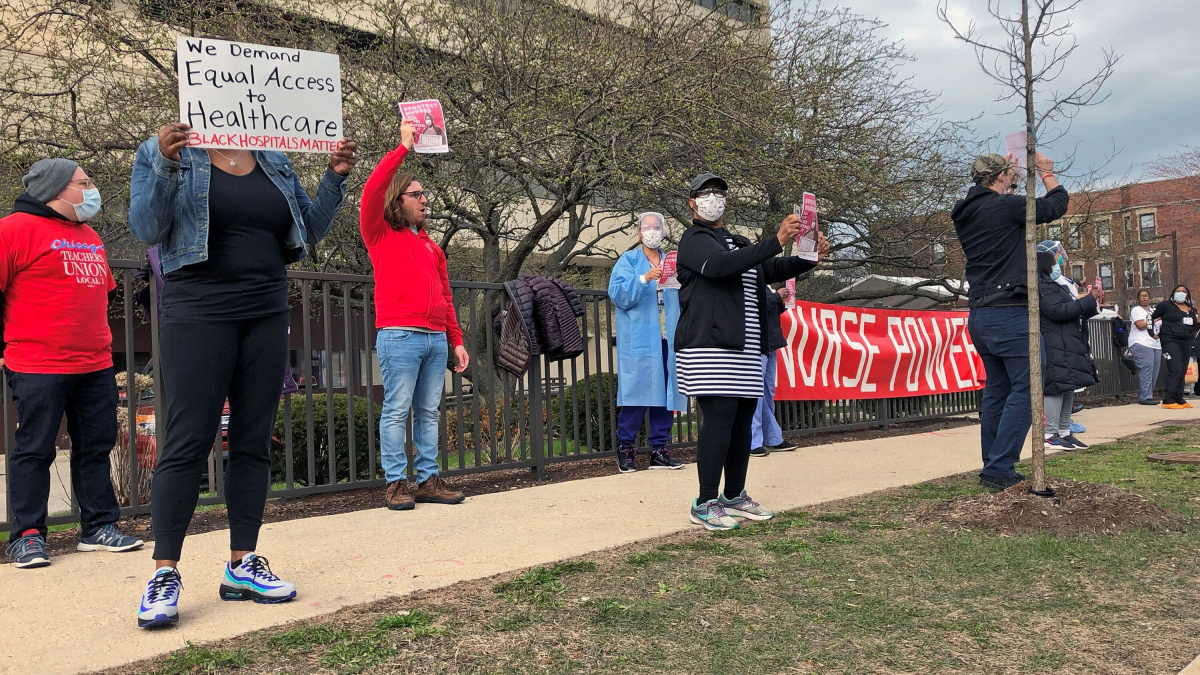Missing word?
"U.S. workers in companies with over 500 employees, or under 50, still are paid sick leave."
Is there a word missing in this sentence?

Health care workers demanded a South Side Chicago hospital remain open during the pandemic. Photo: Alan Maass.
At this moment of unprecedented crisis, how can we ensure the physical safety and economic health of U.S. workers? According to a recent USA Today op-ed by four national union leaders—“Coronavirus is a stress test for capitalism, and we see encouraging signs”—the answer is partnering with “well-managed companies” who can “lead the recovery by pulling together and finding new ways to protect, pay and retain employees.”
We respectfully disagree. Faced with the coronavirus, the only way to protect the lives and livelihoods of working people is through class struggle, not class snuggle.
It’s true that some employers have enacted relatively pro-worker measures in response to COVID-19. But it’s surprising that an op-ed written by labor leaders fails to note the obvious reason for this benevolence: these companies have been compelled to do so by worker action, including the presence of labor unions.
All companies—even those with the most enlightened CEOs—are pushed by market competition to prioritize profits above all else. That’s why working-class people can’t ask “good” corporations to save us. We have to save ourselves.
This is true in unionized workplaces, as seen by the nationwide upsurge of nurses demanding employers put safety needs over their bottom line. And it is true in non-union workplaces like Amazon and Whole Foods, where workers over recent weeks have led a heroic wave of walkouts for basic protections.
Many of these struggles have already won important gains. Amazon was pushed by the protests to finally start providing masks to warehouse workers and take the temperature of employees before their shifts. And after its walkout, Instacart announced it would meet its employees’ demands for health and safety kits.
But it will take a lot more struggle and a lot more workplace organization to win the urgent economic and health measures that working people so desperately need to weather the worst crisis in generations.
Essential workers across the country continue to risk their lives, and receive poverty wages, due to employer greed. Women and workers of color disproportionately shoulder these burdens. It’s not just our physical health that is at risk today. Faced with the coronavirus crisis, the emergency economic protections granted in the United States pale in comparison to most industrialized countries.
U.S. workers in companies with over 500 employees, or under 50, still are paid sick leave. A one-time $1,200 check from the government won’t come anywhere near to making us whole in the face of what will likely be the worst economic crisis since the Great Depression, and it entirely leaves out millions of undocumented workers. Finally, we remain the only major country on earth not to guarantee universal healthcare as a right, so many of the over 22 million people who have lost their jobs over the past month now risk bankruptcy in addition to the virus.
Capitalism is failing the stress test of COVID-19—and we won’t change this by appealing to the morality of corporate leaders. Employers understand that granting robust welfare protections and recognizing unions would significantly cut into their profits and power—which is why Amazon is firing workers who dare to organize, why Trader Joe’s is actively union-busting, and why corporate-backed politicians on both sides of the aisle have failed to back the ambitious People’s Bailout that this moment requires.
Labor unions today have the political opportunity and moral responsibility to help organize a movement of the whole working class, organized and unorganized alike, to fight for the safety and welfare protections that we all deserve. Like the workers at Sprouts Farmers Market in McAllen, Texas who won increased social distancing in their store by building a super-majority of support with their co-workers to demand safer working conditions from the boss, we cannot wait for corporations to do the right thing, we need to force them to.
Signed:
Carl Rosen, President, United Electrical, Radio & Machine Workers of America (UE)
Sal Rosselli, President, National Union of Healthcare Workers
Maria Svart, National Director, Democratic Socialists of America
Jed Dodd, Vice President, Brotherhood of Maintenance of Way Employees Division-International Brotherhood of Teamsters
Dan Russell, Executive Vice President, UPTE-CWA 9119
C. Robert McDevitt, President, Unite Here! Local 54
John Pearson, President, AHS Chapter SEIU 1021
Ashley Payne, Vice President, Contra Costa County Chapter SEIU 1021
Richard Hooker, Secretary-Treasurer, Teamsters Local 623
Keon Liberato, President, Pennsylvania Federation-Brotherhood of Maintenance of Way Employees Division-International Brotherhood of Teamsters Local 3012
Dave Bernt, Teamsters Local 705 and Co-Chair, Teamsters for a Democratic Union
Rand Wilson, Chief of Staff, SEIU Local 888
Matt Taibi, Secretary-Treasurer of Rhode Island Teamsters Local 251
Peter Hart, Puget Sound Regional Director, Inlandboatmen's Union of the Pacific/Marine Division of the ILWU
Cherrene Horazuk, President, AFSCME 3800, University of Minnesota Clerical Workers
Josh Armstead, Vice President, UNITE HERE! Local 23, DC Chapter
Sheigh Freeberg, Secretary-Treasurer, UNITE HERE! Local 17
Brenda Rodrigues, President, SEIU Local 888
Rebecca Garelli, Co-founder & Lead Organizer for Arizona Educators United
Laura Gabby, Trustee, Carpenters Union Local 157
Erin O’Callaghan & Sagen Cocklin, Co-Presidents, UIC Graduate Employees Organization, AFT Local 6297
Merrie Najimy, President, Massachusetts Teachers Association
Max Page, Vice President, Massachusetts Teachers Association
Adam Pelletier, Local President, AFGE Local 3343
Kelly Collings, Co-Chair, Caucus of Working Educators in the Philadelphia Federation of Teachers
Local 32035, the DSA Unit of the WBNG
Add your name here.
"U.S. workers in companies with over 500 employees, or under 50, still are paid sick leave."
Is there a word missing in this sentence?